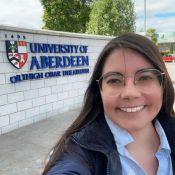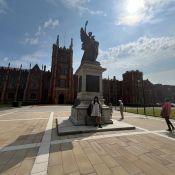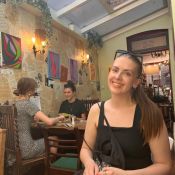
A Really Fun Guide to London
I’ve absolutely loved exploring London during my studies. This city has so much to offer! From events and live music to pubs, nightlife, food, and even just relaxing in the parks, there’s something for everyone. Here are some of my top picks:
Pubs
Two of my favourite pubs are along the River Thames, and the views are absolutely gorgeous!
- Oyster Shed (City of London): Perfect view of the Shard! It’s a bit on the pricier side, but the riverside ambiance makes up for it.
- The Ship (Wandsworth): Watching the sunset here is simply stunning.
Other nightlife
- Cafe Sol (Clapham): Always a fun night out with good music and a great vibe.
- The Blues Kitchen (Camden): A chill, low-key bar with live music.
- SOMA (Soho): Minimalist underground speakeasy cocktail bar. I’ve been to the Soho branch, but I’ve heard that the Canary Wharf one is also good.
- Pear Tree Cafe (Battersea Park): Great vibes day or night, perfect for grabbing an iced coffee or a drink.
Restaurants
- Flat Iron (Multiple locations): Amazing steak! I recommend the flat iron steak with truffle mac and cheese.
- The Flygerians (Peckham): Really good Nigerian cuisine. Their jollof rice, efo riro, and plantain is delicious.
- El Metro Tapas Bar (Fulham): Great tapas selection and vibey interior.
- Masigo (Angel): Lovely service and fantastic Korean food.
- Willows (Clapham): Perfect for brunch! You can build your own brunch board with lots of options.
Scandinavian Food
As a Norwegian, I had to dedicate a section to Scandinavian food. It’s always nice to get a little taste of home!
- ScandiKitchen (Fitzrovia): Cafe and shop with the best of Scandinavian food and products.
- TotallySwedish (Barnes): Swedish food with that familiar Nordic comfort.
- Black Sheep Coffee (Multiple locations): This chain actually serves Norwegian waffles with brown cheese and jam and they’re so good!
Parks
I love chilling in these parks with a book or having a picnic and playing games with friends:
- Battersea Park
- Kensington Gardens
- Richmond Park
Other Fun Stuff
- Gravity (Wandsworth): Arcade, bowling, minigolf, darts, bar, and gokarting. All in one place!
- BookBar (Islington): Bookshop meets coffee and wine bar. Sit down with a book, coffee, or glass of wine and enjoy.
I hope you get the chance to check out some of these places and enjoy my top picks in London!
- Erica

How am I going to pay for this?
Hello, I’m Diana, a nearly 30-year-old Mexican woman about to finish her master’s degree at the University of Sussex in England. When I decided to pursue a master’s degree, I had no idea where or what exactly I wanted to do; I just knew that I wanted to expand my academic and professional experience and seek something different that would give me perspective.
After talking to as many people as I could, I realised that in the end it was about doing something that would excite me, inspire me, and push me to feed my curiosity.
Doing a postgraduate degree abroad was a long journey that began long before I even applied. Finding at least an idea of which path to follow led me into a spiral of worry and anguish. What did I want to do? Where should I start? What are my real options? And finally, where am I going to get the money to do it?! The accompaniment of Across the Pond and the certainties I gained with FIDERH funding allowed me to see the idea of my life project as a real and achievable opportunity.
I had never studied abroad, nor had I even visited England at that time. During my applications, I realised EVERYTHING I needed to cover, budget, scholarships, accommodation. That’s how I came to Across the Pond. With the help of my advisor, I was able to find a clear guide to cover all the requirements I needed. She gave me the calm I needed by answering all the questions I had about the processes I had to face.
From Across the Pond, I knew and understood more about FIDERH, because although I was familiar with the fund, considering financing intimidated me. With the information my advisor provided, I understood how friendly this fund designed for students is, especially in its payment processes (because, of course, I thought, 'How am I going to pay for this?').
This year has been a challenging experience, yet one that has filled me with a sense of satisfaction. It allowed me to recognise myself and everything I add to the spaces in which I develop. Imposter syndrome has never been more real, but today I can look at my experience with admiration, which was more than just an academic goal. Having the support of FIDERH allowed me to achieve a level of self-validation and satisfaction that I had not previously felt, as I realised I had managed to bring myself to this point. I satisfied my desire to develop in a completely different environment. Sharing and learning from people with experience in various fields and professions gave me the perspective I was looking for.
I would definitely do it again.
- Diana
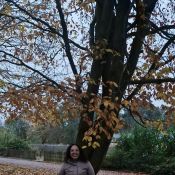
The UK felt like the perfect place
I decided to pursue an MA in Creative Writing because I have always been passionate about storytelling, and the UK felt like the perfect place to do so. Many universities there have strong programs in this field, and I was eager not only to learn from them but also to live abroad, meet people from different cultures, and experience a new academic environment. I chose the University of Derby because its program emphasized employability, with modules such as Working as a Writer, which gave me practical tools for considering writing as a profession.
I lived in Agard Court, one of the university halls, which gave me the chance to meet both UK and international students. They quickly became friends, many of whom I’m still in touch with, and helped me adapt to cultural differences. Derby itself was a wonderful place to live: it’s a small, charming, multicultural city where I felt safe and inspired. I used to write in cafés in the city centre and loved walking in Darley Park, which is simply beautiful.
Of course, adapting was not always easy. As a Mexican student, even though I already spoke English, writing in a second language came with its challenges. I had learned mostly the US system, so I had to adjust to British spelling and academic conventions. For example, reflective essays were something new to me, since in Mexico academic writing tends to focus more on facts than on one’s own ideas. At first it was difficult, but over time I came to appreciate how much value was placed on originality and critical thinking. Having friends to guide me through cultural and linguistic details helped as well. For instance, learning not to use ‘trash’ but ‘bin,’ and to always boil water in a kettle, never in the microwave!
The course itself was a dream fulfilled. The MA gave me the chance to share my writing with peers in workshops, receive feedback from professors with real-world recognition, and grow more confident in my own voice. These discussions and exchanges made me realize what kind of stories I want to tell, and that writing is not just a solitary pursuit but also an opportunity for dialogue.
Student life was full of small but meaningful moments. I spent most of my free time with friends I met in my accommodation and classes. We went to pubs, the cinema, or even to cafés where we could paint pottery together. It was a balance between studying, writing, and simply enjoying the experience of living abroad.
Looking back, I am grateful for everything I learned, not just academically but also personally. I discovered new ways of thinking and writing, built friendships across cultures, and proved to myself that I could adapt to a different system. It was challenging at times, but it was also inspiring, and it made me more certain than ever that writing is the path I want to pursue.
- Jimena
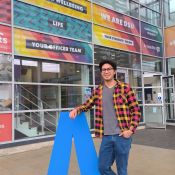
What if it IS possible? From Mexico to the UK with a purpose and a planner
It all started with an Instagram ad (and a gut feeling)
While I was looking for master’s options in Mexico and already feeling the academic cycle slipping away, I came across an ad from Across the Pond on social media: “Would you like to study in the UK with support from CONACYT / FUNED?” It was as if the algorithm knew exactly what I needed to see. Even though I thought it was already too late to apply, that question sparked something in me: what if it IS possible?
What attracted me most about the UK was the one-year programme duration, the flexibility, and the professional focus of its universities. Coming from a musical background and looking to move into cultural management, the UK seemed like the perfect bridge to transform my career.
Choosing De Montfort University: creativity, practice and community
After reviewing many options, De Montfort University (DMU) was the one that truly convinced me. Their MA in Cultural Events Management didn’t just focus on the artistic side, but also on planning, leadership, and real-world festival management. In no time, I received an offer letter and realised it was all becoming real.
DMU offers a diverse, inclusive environment, approachable lecturers, and countless extracurricular opportunities. From day one, I felt that my voice mattered, even when I was still insecure about my English.
Funding my master’s with FIDERH and FUNED: a strategic investment
Applying to FIDERH and FUNED was a major and challenging step. The paperwork, the essays, the decisions... at times, I felt overwhelmed. But having my family’s support and the guidance from Across the Pond was key. They helped me stay focused and reminded me that I wasn’t alone.
Although I was afraid of taking on debt, I came to understand that FIDERH and FUNED weren’t just loans – they were strategic tools that allowed me to study without as much financial pressure. I’m currently in the grace period, preparing to take on that responsibility with much more clarity and confidence.
Shared house, shared laughs: my accommodation experience
For my first 10 months, I lived in student accommodation, and I totally recommend it for anyone arriving for the first time. The facilities were comfortable, the space wasn’t huge but definitely enough, and the reception and maintenance teams were always ready to help with any issue.
Now I live in a house, but starting in student accommodation made everything simpler. My advice: research hidden costs if you’re renting independently. Sometimes the simplest option is what gives you the most peace of mind, especially in your first year.
Academic English: from blocked to unlocked
Yes, studying in English was tough. At first, I felt insecure about speaking, writing essays, or participating in seminars. But the university always provided support, patience, and resources to help us improve. Nobody judged our mistakes – instead, they valued the effort to grow.
What helped me most was networking, not being afraid to speak up, and asking for corrections. The language stopped being a barrier when I started treating it as a tool that evolves with you.
Leicester: the city that helped me stay focused
Leicester isn’t London, but it has everything you need: diversity, culture, peace, and opportunities. It’s a city where you can focus without constant distractions. It has creative spaces, museums, festivals, and a rich multicultural atmosphere.
If your priority is to study while still having access to art and culture, I definitely recommend Leicester.
Beyond the classroom: films, culture and community
In my free time, I enjoy going to the cinema, visiting museums, attending concerts, bars, and trying new food. I also volunteered at festivals, joined the Latin Society and the Radio Society at DMU, and attended many extracurricular workshops and talks offered by the university to train future cultural leaders.
Making friends isn’t always easy at first. But once you connect with someone, it’s for life. I’ve made friends from Mexico, Latin America, Taiwan, Bangladesh, Nepal, India, Malaysia, Brazil, and more.
Lessons for Latin American students
If I could give you one piece of advice, it would be this: learn how to really use a planner.
Not just to write down appointments, but as a structure for your personal goals, time, habits, rest and progress. Everything here is scheduled in advance, via email, and organised. Starting to use a proper planner before coming to the UK will help you adapt and make the most of your time.
(Not even joking: sometimes it feels like you need to schedule being sick two weeks in advance!)
Thank you, Across the Pond
Thanks to their guidance and support – especially from my advisors – I was able to understand the application process, clear my doubts, structure my essays and documents better, and never feel alone. Having that kind of free, trustworthy support made a huge difference.
And if you're reading this with doubts...
Believe me, I’ve been there too. Full of questions, insecurities, fear of rejection, fear of the language, money, and the change. But what I discovered is that the UK is not an impossible dream. With the right strategy, support, networks and clarity of purpose, it IS possible.
You’re closer than you think. All that’s left is for you to take the first step.
- Javier
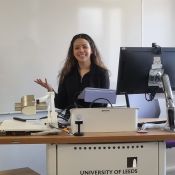
Rich history, academic excellence, and global reputation
Why did you decide to study in the United Kingdom?
The United Kingdom had always attracted me for its rich history, academic excellence, and global reputation. The prospect of pursuing a master’s degree in England seemed highly enriching, both professionally and culturally. In addition, the University of Leeds —the institution I applied to— is renowned for its diversity of people and cultures. I knew that the friendships and professional connections I would find there would provide me with a global outlook and a valuable network.
How was your experience with FIDERH, FUNED, or other support?
To achieve my goal of studying at this university, I turned to different scholarships and funding opportunities such as FIDERH, SECIHTI, and excellence scholarships awarded by the university itself. Each of these sources of support was essential, and the guidance from Across the Pond proved invaluable in helping me identify and secure them.
What did you learn and what advice would you give?
My advice for anyone who shares the goal of pursuing a postgraduate degree in the UK is simple: get informed, stay organised, and take it one step at a time. The opportunities to achieve your goals exist; it is a matter of finding them and daring to pursue them. The process can be competitive, but do not be afraid of rejection or of trying again. Remember that there are people with experience who are willing to guide and support you along the way to help you achieve the best results. By following their advice and ticking off your checklist step by step, you will find yourself living your goal sooner than you think.
- Ana


